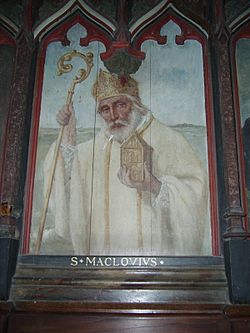Loading AI tools
Founder of Saint-Malo, Brittany (d. 621) From Wikipedia, the free encyclopedia
Saint Malo (French pronunciation: [sɛ̃.ma.lo]; also known as Maclou, Maloù or Mac'h Low, or in Latin as Maclovius or Machutus, c. 27 March 520 – 15 November 621) was a Welsh mid-sixth century founder of Saint-Malo, a commune in Brittany, France. He was one of the seven founding saints of Brittany.
Saint Malo of Aleth | |
|---|---|
 Saint Malo | |
| Born | c. 27 March 520 Traditionally Llancarfan, Glywysing |
| Died | 15 November 621 (aged 101)[lower-alpha 1] Archambiac, Duchy of Aquitaine |
| Venerated in | Roman Catholic Church Eastern Orthodox Church |
| Major shrine | Saint-Malo Cathedral |
| Feast | 15 November |
| Attributes | Depicted as an abbot and a bishop |
| Patronage | Saint-Malo, pig-keepers, lost items |
Malo's name may derive from the Old Breton machlou, a compound of mach "warrant, hostage" and lou (or loh) "brilliant, bright, beautiful".[1]
Malo was probably born in Llancarfan (Wales) in approximately 520. He was the son of Dervel, sister of Amwn Ddu, and therefore cousin to St. Samson. He was placed in the abbot's care at a tender age, and grew up at the abbey, where he was ordained priest and assigned the office of preacher.[2]
As a monk at Llancarfan Abbey in Wales, Malo was known for his participation in the voyage of Brendan the Navigator. Malo became Brendan's favourite disciple.[3]
A number of legendary tales of the adventures of Brendan and Malo survive. According to the Voyage of Saint Brendan the Abbot, they and their companions discovered the "Island of the Blest". Another story tells of an encounter with Maclovius, a dead giant whom Brendan temporarily revives and baptizes.[4]
On a second voyage, Brendan and Malo are said to have visited and evangelized locations including Cézembre, the Orkney Islands, and the northern isles of Scotland.[5]

At Aleth, Malo served under a venerable hermit named Aaron. Upon Aaron's death in 544, Malo continued the spiritual rule of the district subsequently known as Saint-Malo and was consecrated as the first Bishop of Aleth (now Saint Servan).[3] Many miracles are related of him there.
In old age, the disorder on the island compelled Malo to leave, but the people soon begged him to return. He obliged his people and returned to restore order. Feeling at the end of his life, Malo was determined to spend his last days in solitary penance. He died at an advanced age during a voyage from Aleth to Archambiac (near Archingeay) in the province of Saintonge. Malo might have died on 15 November 621 (although this may be the death date of Saint Marcoult).[2]
The city of Saint-Malo is one of the seven stages in the Tro Breizh ("Tour of Brittany", in Breton), a pilgrimage celebrating the seven founding saints of Brittany.[6]
Indirectly, the Spanish name of the Falkland Islands, Islas Malvinas, can be traced to Malo, as it is derived from the French, Îles Malouines and named by Louis Antoine de Bougainville in 1764 after the first known settlers: mariners, and fishermen from the port of Saint-Malo.[7]
Pontoise Cathedral is dedicated to Saint Malo. Lesmahagow Priory in South Lanarkshire is also dedicated to him in the Latin form of his name, Machutus. He is the patron saint of the churches of St. Maughans and Llanfaenor in Monmouthshire and Llanfechell in Anglesey.[2]
The place-name Saint-Maclou also refers to him.[8]
Seamless Wikipedia browsing. On steroids.
Every time you click a link to Wikipedia, Wiktionary or Wikiquote in your browser's search results, it will show the modern Wikiwand interface.
Wikiwand extension is a five stars, simple, with minimum permission required to keep your browsing private, safe and transparent.